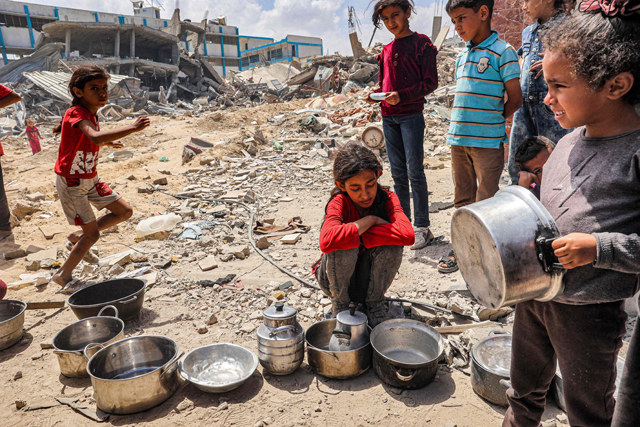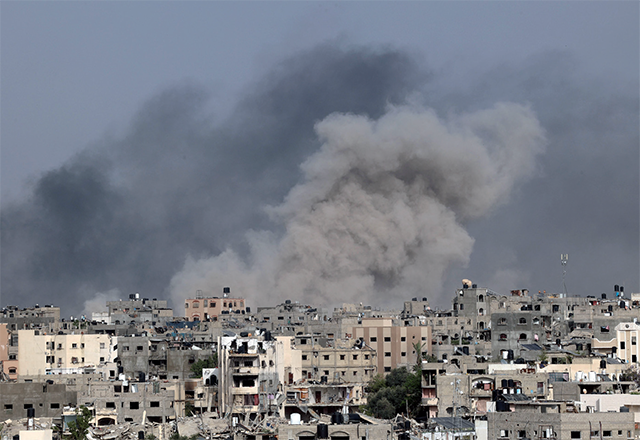You are here
Fierce battles rage across Gaza as US calls for post-war plan
By AFP - May 15,2024 - Last updated at May 15,2024

Children wait with pots to receive food rations from an outdoor kitchen in Khan Yunis in the southern Gaza Strip on Tuesday amid the ongoing Israeli attack on the Palestinian territory (AFP photo)
RAFAH, Palestinian Territories — Israeli forces persisted with its offensive against the Gaza Strip, forcing new waves of Palestinian mass displacement.
Clashes have rocked the densely crowded far-southern city of Rafah but also flared again in northern and central Gaza, months after troops and tanks first entered those areas.
The United States has urged Hamas to accept a Gaza truce plan and called on Israel to devise "a strategic endgame" and post-war plan, said White House National Security Adviser Jake Sullivan.
This would help Israel avoid "getting mired in a counterinsurgency campaign that never ends and ultimately saps Israel's strength and vitality", Sullivan said on Monday.
Israel last week defied a chorus of warnings — including from top ally Washington which paused a shipment of bombs — and sent tanks and troops into the east of Rafah to pursue fighters.
At the same time, fighting has flared in north Gaza four months after the army said Hamas' command structure there had been dismantled, and six months after defence minister Yoav Gallant said Hamas had "lost control" of Gaza.
Recent battles and heavy Israeli bombardments have been reported around Rafah as well as in Gaza City and Jabalia refugee camp in the north and Nuseirat camp in the centre.
More than seven months into the war, Israeli strikes and ground combat claimed another 82 lives in Gaza over the past 24 hours, the health ministry in the Hamas-run territory said.
That is the highest daily toll reported by the ministry in more than two weeks.
Nearly 450,000 Palestinians have been newly displaced from Rafah in recent days, and around 100,000 from northern Gaza, UN agencies said.
That means around a quarter of Gaza’s population of 2.4 million people have been freshly displaced in the past week.
Palestinian mother Hadeel Radwan, 32, who is displaced in western Rafah, told AFP the constant shelling left her terrified while enduring shortages including of drinking water.
Many people had fled her Tal Al Sultan district, but she said joining them would be hard because, “I had a C-section and moving quickly, under threat, would be difficult for me.”
Aid trucks ransacked
Talks towards a truce and hostage release deal have stalled after months of efforts involving US, Egyptian and Qatari mediators.
Qatari Prime Minister Mohammed Bin Abdulrahman Al-Thani said that “unfortunately things didn’t move in the right direction and right now we are on a status of almost a stalemate”.
“Of course, what happened with Rafah has set us backward,” he added of Israel’s insistence on launching a ground attack in the city.
“There is no clarity how to stop the war from the Israeli side. I don’t think that they are considering this as an option... even when we are talking about the deal and leading to a potential ceasefire,” Sheikh Mohammed said.
Since Israeli troops moved into eastern Rafah, the aid crossing point from Egypt remains closed and nearby Kerem Abu Salem crossing lacks “safe and logistically viable access”, a UN report said late on Monday.
It said fuel shortages threaten health services, and acute child malnutrition is rising.
A convoy of trucks delivering humanitarian aid from Jordan was attacked and vandalised by Israeli far-right activists on Monday, its cargo spilt onto a road near a crossing with the occupied West Bank.
The United Nations said an Indian member of its security services was killed and another wounded when their UN vehicle was struck on the way to a hospital in Rafah.
Israel’s military said the strike was “under review” and that “an initial inquiry conducted indicates that the vehicle was hit in an area declared an active combat zone”.
The UN said it had informed the Israeli authorities of the movements of the vehicle.
Human Rights Watch said it had identified at least eight occasions since the war began when Israel had targeted known aid worker locations in Gaza, after their coordinates were shared to ensure their protection.
Related Articles
RAFAH, Palestinian Territories — Israel and Hamas on Monday both angrily rejected moves to arrest their leaders for war crimes made before a
RAFAH, Palestinian Territories — An Israeli strike killed 31 people in central Gaza on Sunday, the Palestinian territory's civil defence age
GAZA CITY, Palestinian Territories — Israel continued with its attack on Gaza on Monday, including in far-southern Rafah, despite US warning














